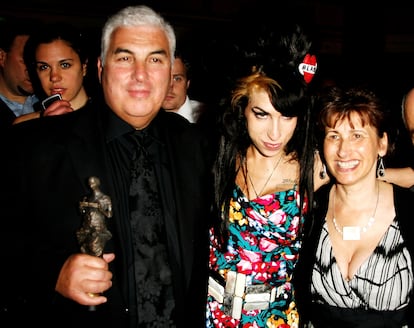Amy Winehouse’s parents release excerpts from the singer’s diaries: ‘I hate my temper. Sometimes I get violent with the ones I love’
To commemorate the late British artist’s 40th birthday, her family has published intimate passages from her notebooks

Amy Winehouse would have turned 40 on September 14. However, the world lost the British singer on July 23, 2011, when she died at the young age of 27 in her London apartment after consuming five times the legal limit of alcohol for driving. Her tragic death was ruled accidental by a London court. Despite achieving remarkable success with hits like Back to Black, Rehab and Valerie, Amy’s life was marked by struggles with bulimia and drug and alcohol abuse. On the occasion of Amy’s 40th birthday, her parents, Mitch and Janis, shared excerpts from her personal diaries with The Telegraph that offer special insights into the thoughts and emotions of a talented singer and songwriter 12 years after her death.
“Amy arrived in the world on 14 September 1983. She was four days late and we always joked that Amy was late for everything — even her own birth,” wrote her parents in The Telegraph. “From the moment we brought her home from hospital, Amy was a true individual. She could be adorable and charming, but if she wasn’t happy everyone knew about it. ‘Be quiet, Amy!’ was probably the most-heard phrase in our house. Whether she was happy or sad, Amy loved the limelight.”
Amy’s diary often aligns with her parents’ observations, showing that she embraced her uniqueness since her teenage years. “I’m pleased that I’m different. I didn’t want to be like everyone else. I love having my own individual style. I love being loud and talking to people. That’s just who I am,” she wrote in her diary.
“Amy documented her school years in a scrapbook that she constantly updated,” wrote her parents. “Her stories describe what she got up to, which always included being told off by her teachers. From the outset, we realized that school was probably never going to fulfil her. ‘I’m bored,’ she often repeated. Teachers told us she was bright and capable, yet there was always a ‘but.’ ... She couldn’t sit still, or she misbehaved in class. Instead, Amy devoured films, musicals, novels, poetry — and music. She could recite lyrics and sing tunes after hearing a song maybe just once or twice. At her nan Cynthia’s house she was surrounded by jazz: from Frank Sinatra to Ella Fitzgerald. And at home she performed songs from Mary Poppins or Jewish hymns.”
Like any teenage diary, Amy’s pages were littered with thoughts about love. She mused: “Sometimes I think, I wonder if there’s someone, some guy out there who’s as crazy as me? A nice guy with dark hair, who wears glasses to read and is a real Indie kid? Piercings optional, Scottish or Irish accent preferably! And why do all my brother’s friends fit this description, yet I’m much too young to do anything about it?”
The man who had the biggest impact on the singer’s life was Blake Fielder-Civil. They had an on-and-off relationship for six years and were married from 2007 to 2009. They met in a pub in Camden Town, London, while they were both dating other people. The attraction was instant, and Amy quickly left her boyfriend to be with Blake. Just a month after they met, she got a tattoo of his name on her left breast, and he got a tattoo of Amy’s name behind his ear. Their tumultuous relationship was filled with alcohol and drug abuse, as well as legal issues. Blake was serving a 32-month prison sentence for armed robbery when he learned of Amy’s death in 2011. After breaking up with Fielder-Civil, Winehouse had a brief four-month relationship with film director Reg Traviss, which she ended after hearing reports of his infidelity.

Winehouse laments in her diaries of having a short fuse, admitting that she sometimes got “physically violent with those I love... As much as I say ‘I’m sorry,’ it’s something they can never forget.” Janis writes about several heated father-and-daughter discussions when Amy was a teenager. “Suddenly she’d interrupt mid-flow. ‘Sorry, Dad. Hang on a minute. I’ve just got to write this down,’ she would announce, before reaching for a pen and paper, noting down whatever Mitch had said, then returning to the argument. Years later some of those words may have ended up in a song.”
In her notebooks, Winehouse wrote songs and funny observations about people she encountered in pubs, clubs, and wherever she went. Ultimately, her lyrics served as a diary, chronicling her life. This was evident in Rehab, one of her most famous songs. Amy’s mother writes, “She’d arrived at his home with her then-managers who had been concerned about her drinking and wanted to take her for professional treatment. ‘I don’t want to go, Dad. I haven’t got 90 days!’ she told Mitch. Several years later, that conversation got filtered through Amy’s creative lens, chopped up and rearranged to become a number one hit.”

Mitch and Janis found it challenging to go through their daughter’s journals, but said, “Despite what many people presume about Amy’s life, we’re hard-pressed to find much torment or misery in any of her writings. That said, reading through it we can’t say that we truly understand her either. Whether or not composing became cathartic for Amy we don’t know for sure, but it was certainly a creative process that she came back to time and again in her happiest periods, as well as in her darkest moments of addiction.”
Nonetheless, Mitch and Janis Winehouse say that reading their daughter’s diaries always alleviates the pain of losing her. “Twelve years on from her death, looking back on these drawings and scribblings still makes us smile, just like Amy did. Of course, we can’t whitewash Amy’s story. Yes, she was an addict, and, yes, her life was chaotic. Ultimately, her addictions robbed her, and us, of her life. But those are times we don’t dwell on.”
Sign up for our weekly newsletter to get more English-language news coverage from EL PAÍS USA Edition
Tu suscripción se está usando en otro dispositivo
¿Quieres añadir otro usuario a tu suscripción?
Si continúas leyendo en este dispositivo, no se podrá leer en el otro.
FlechaTu suscripción se está usando en otro dispositivo y solo puedes acceder a EL PAÍS desde un dispositivo a la vez.
Si quieres compartir tu cuenta, cambia tu suscripción a la modalidad Premium, así podrás añadir otro usuario. Cada uno accederá con su propia cuenta de email, lo que os permitirá personalizar vuestra experiencia en EL PAÍS.
¿Tienes una suscripción de empresa? Accede aquí para contratar más cuentas.
En el caso de no saber quién está usando tu cuenta, te recomendamos cambiar tu contraseña aquí.
Si decides continuar compartiendo tu cuenta, este mensaje se mostrará en tu dispositivo y en el de la otra persona que está usando tu cuenta de forma indefinida, afectando a tu experiencia de lectura. Puedes consultar aquí los términos y condiciones de la suscripción digital.









































